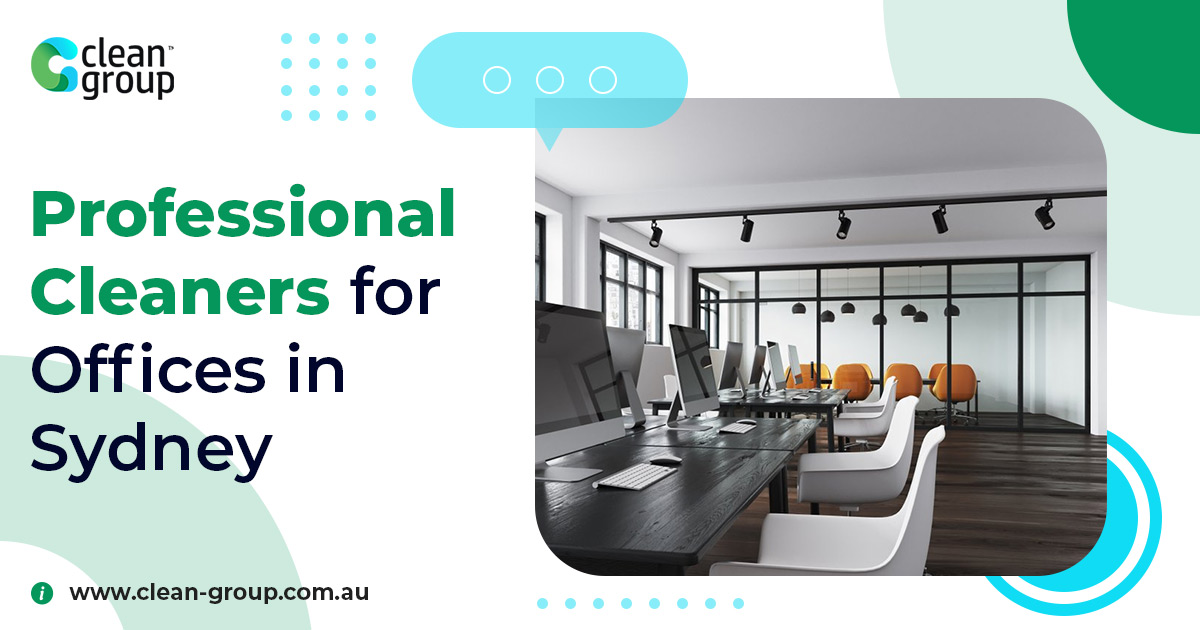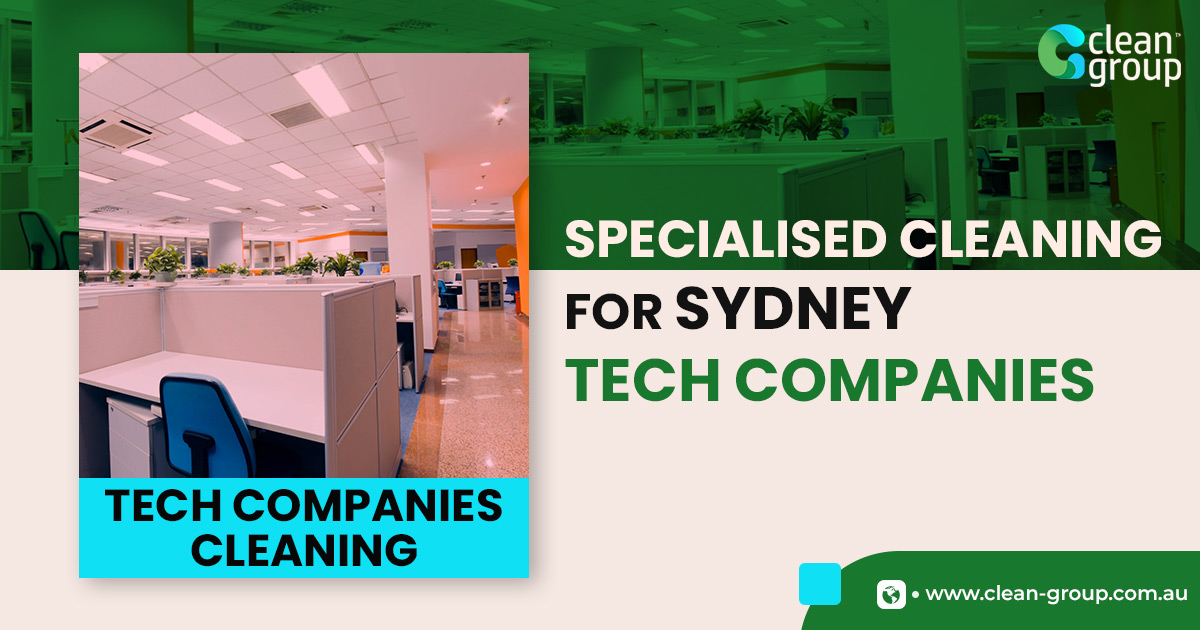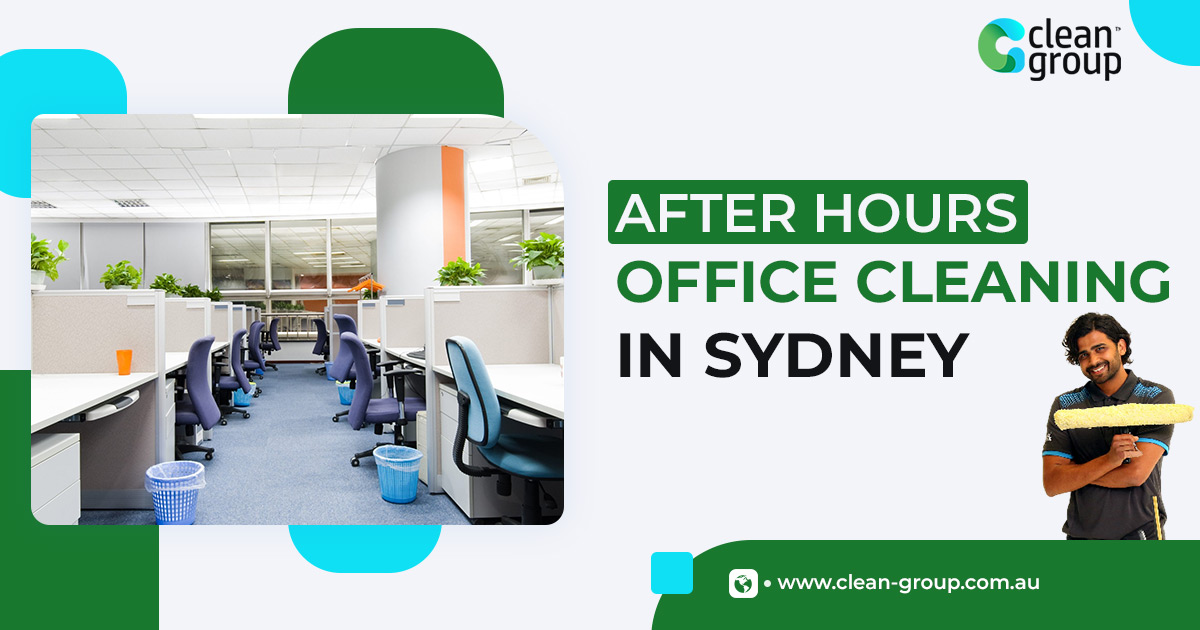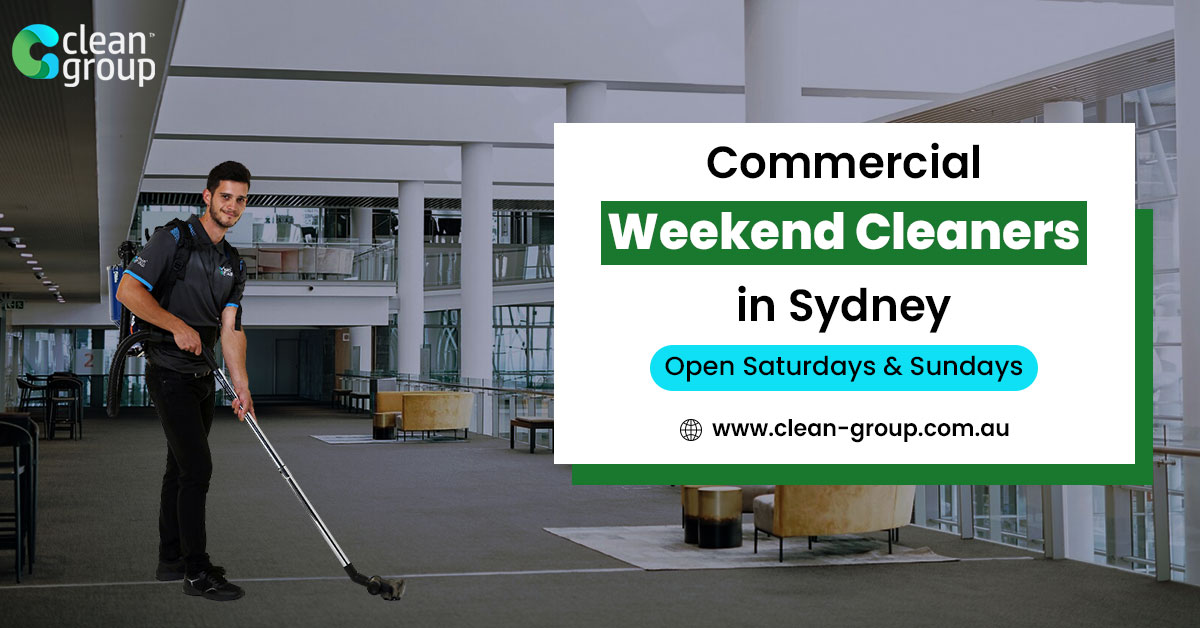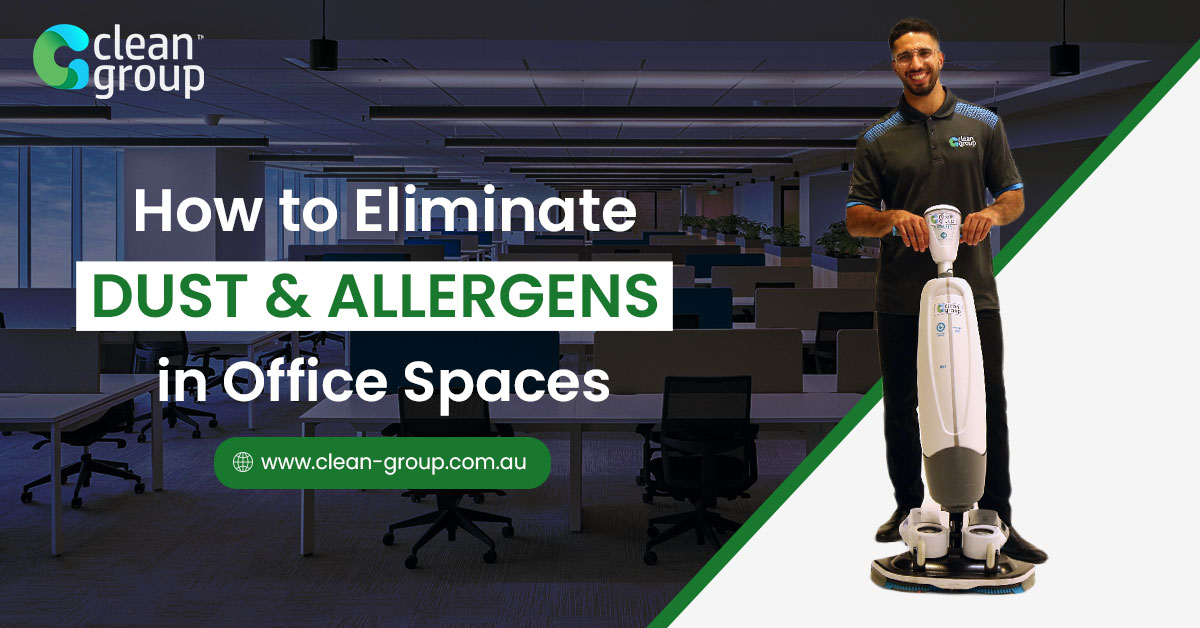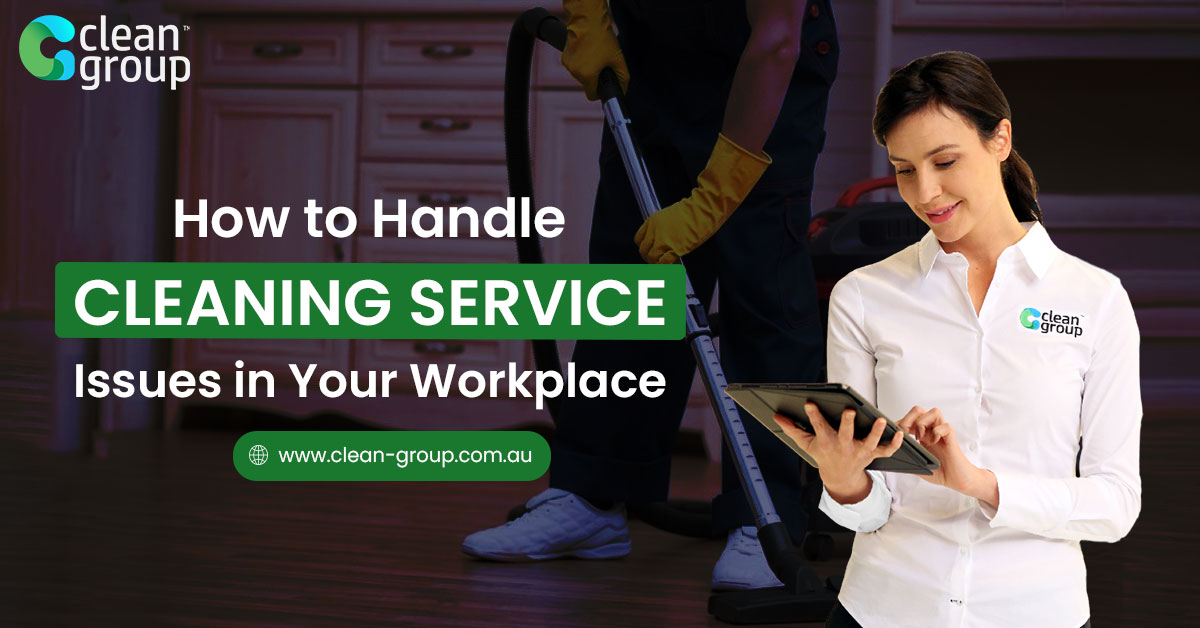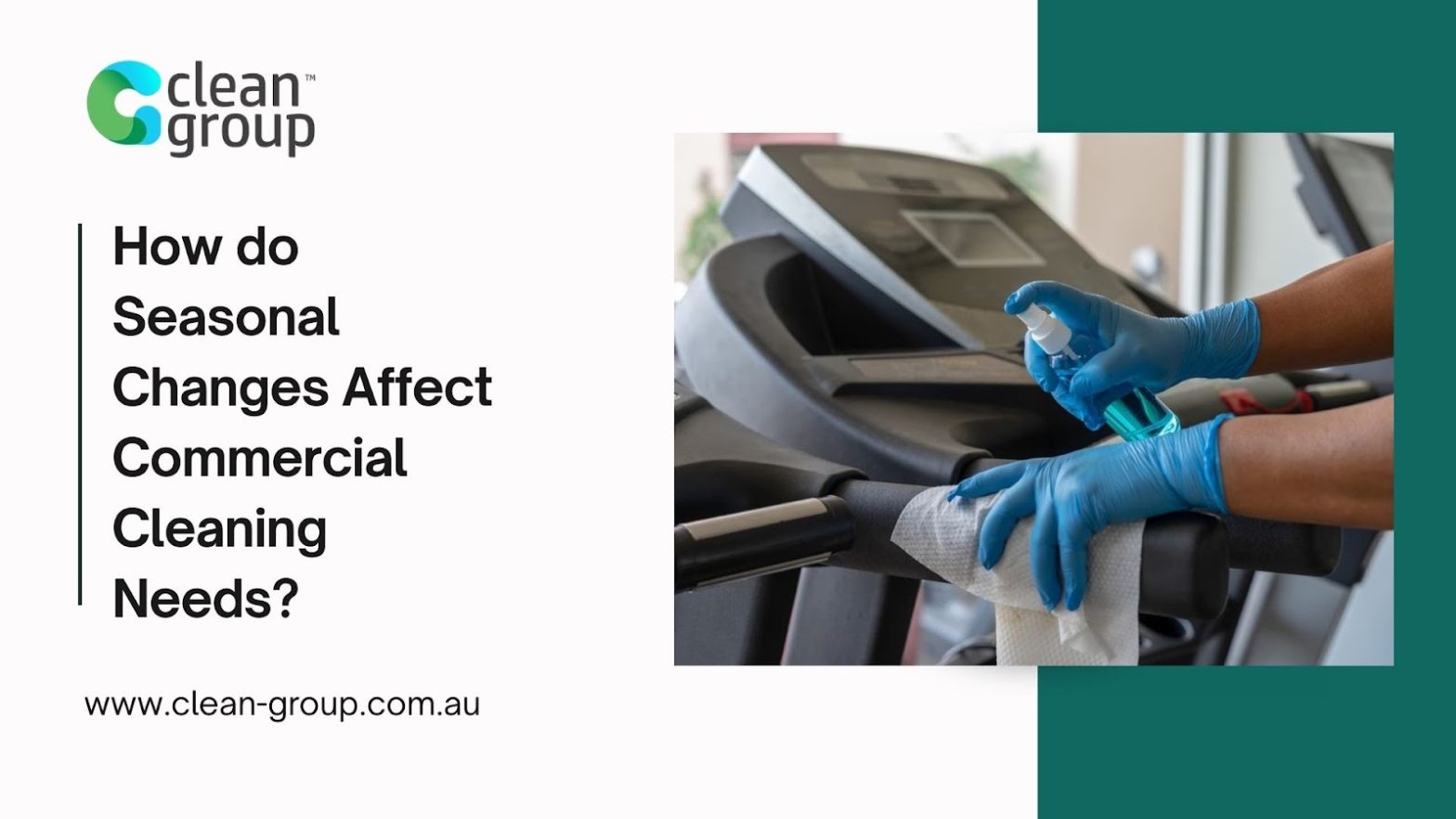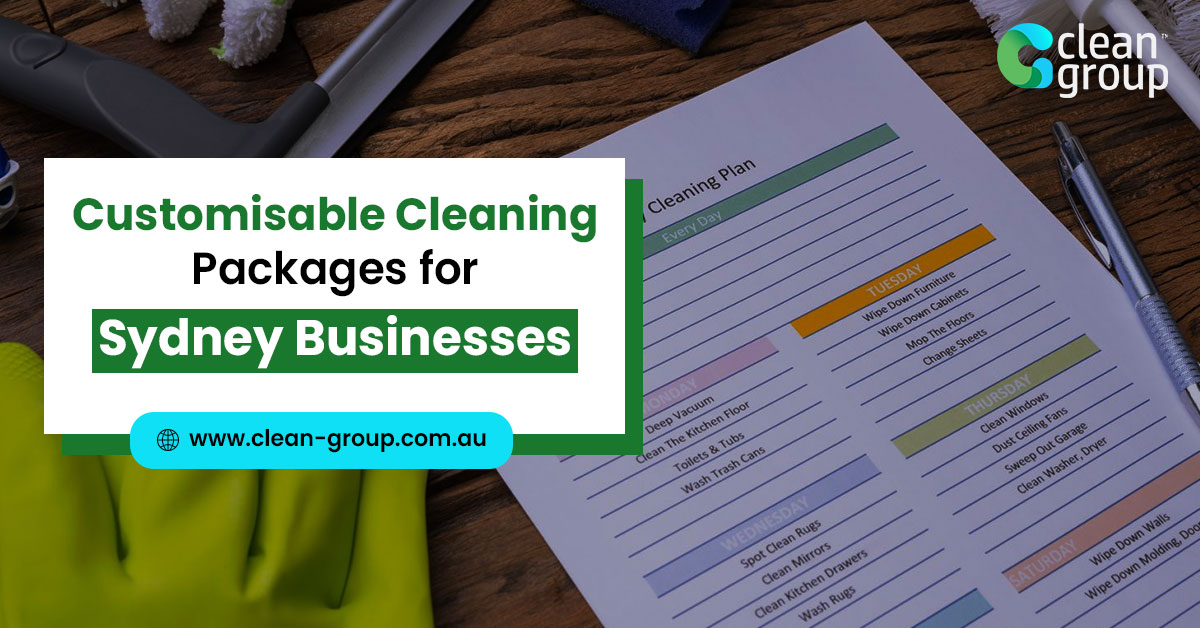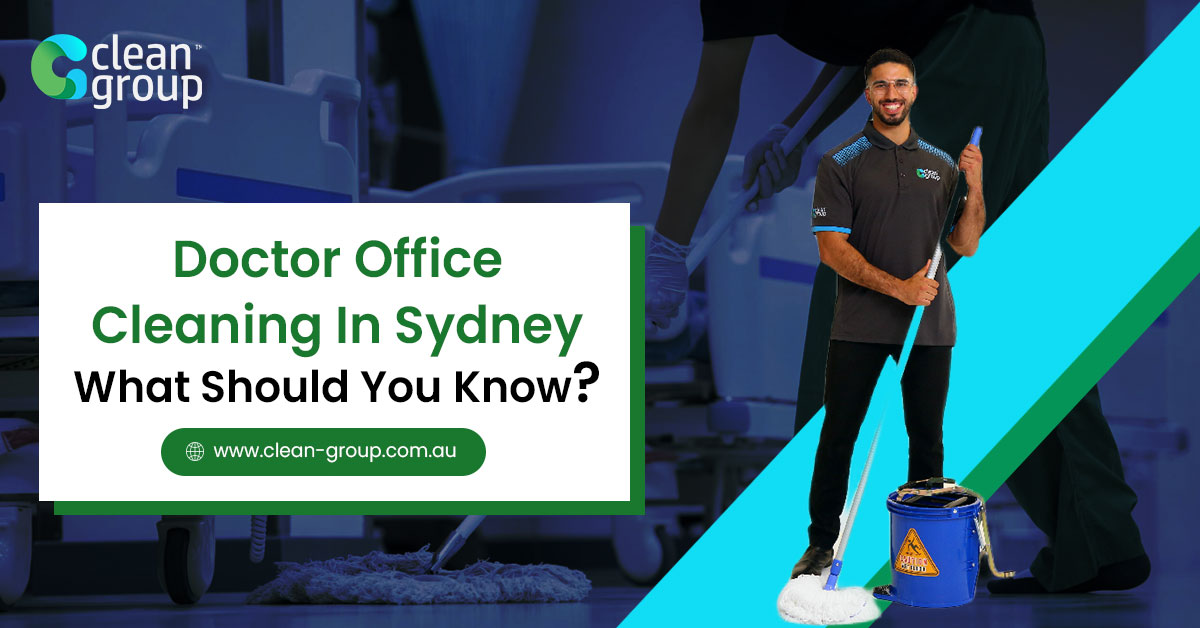Choosing the right cleaning company is a crucial step in ensuring a healthy, productive, and impressive workplace environment. Whether you manage a small retail store, a large office, a medical facility, or a warehouse, spotless premises make a great impression on visitors and boost safety. That’s why partnering with a reliable, professional, and reputable commercial cleaning provider is important.
At Clean Group, we’ve been redefining benchmarks in the Australian commercial cleaning industry for the last 25 years. From Sydney to Brisbane and Melbourne, we are the go-to choice for property owners seeking reliability, quality, and results. Wondering what truly sets us apart? Let’s explore why Clean Group is trusted by hundreds of Australian businesses, property managers and builders for highly effective cleaning services.
Why is Choosing the Right Commercial Cleaning Company Important?
Choosing the right cleaner for your commercial property is crucial for the safety and health of both your employees and clients. Unlike a regular janitor who can only do basic maintenance, an office cleaning service from Clean Group is much more comprehensive and delivers real results that enhance your brand image and operational efficiency.
A clean, well-maintained office space not just reflects a positive brand image but also ensures the safety of workers and visitors by minimizing germs. In contrast, a poorly maintained workplace can impact your employees’ productivity and morale, as well as hurt their well-being. It can also affect your company’s reputation and turn potential customers away.
Choosing a reliable cleaning provider is necessary to ensure your premises are kept spotless and germ-free at all times, complying with health and hygiene regulations. This is even more important if you work in a sensitive industry like healthcare, food service, or child care.
- Professional cleaners are trained and equipped for high-performance cleaning
- They are police verified, insured, and well-behaved
- They can handle complex tasks such as office disinfection
- They offer customised plans tailored to your unique needs and goals
- They are self-managed: Save time and resources by avoiding the need for constantly managing cleaning tasks or teams yourself.
- Let you focus on what truly matters—growing your business
Why Choose Clean Group
Here’s why you can trust Clean Group for outstanding cleaning results, every time:
1. ISO Certified: Quality You Can Rely On
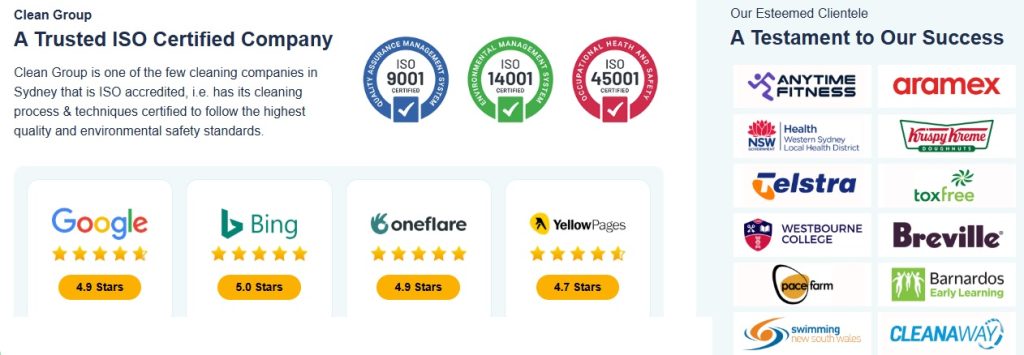
In the commercial cleaning industry, an ISO certification is a testament to a company’s global standards in quality and health. Only about 5% of cleaning companies in Sydney hold this prestigious certification. Clean Group is proud to be one of them.
As an ISO certified commercial cleaner in Sydney, we provide services that meet rigorous international benchmarks for:
Quality Management (ISO 9001): Our meticulous protocols are designed to ensure consistent, high-quality performance in every job.
Environmental Management (ISO 14001): We use eco-friendly methods and products that help reduce the environmental impact of cleaning.
Occupational Health & Safety (ISO 45001): We use proper tools and techniques to maintain the safety of our staff and clients during our work.
Our ISO accreditation is an indication of our commitment to organised, safe, efficient, and environmentally friendly cleaning. When you hire Clean Group, you’re choosing a company that practices world-class standards.
2. Over 25 Years of Industry Experience
Our vast industry experience reflects our proven track record of trust, transparency, and continuous progress.
With over 25 years in the commercial cleaning industry, Clean Group is uniquely specialised in handling diverse business spaces, from corporate offices to strata complexes, educational institutions, and high-risk medical facilities.
We stand out for our:
- Efficient team selection based on project size and goals
- Customised cleaning solutions for different businesses
- Compliance with health and safety standards
- World-class cleaning techniques and equipment
Our continued successful presence in the Australian cleaning space reflects the satisfaction and trust of hundreds of loyal customers. This incredible experience assists us in every job and motivates us to do better every time.
3. Proactive Quality Control Process
At Clean Group, we are committed to quality and safety in our services.
Our proactive quality control process is designed to save your time and money by eliminating surprises. By performing routine property inspections every 6 weeks, we ensure that our results meet your expectations. Our inspections are systematic, well-planned, and documented in comprehensive reports for your benefit.
Here’s how we do it:
Routine Site Visits: Our quality assurance team performs routine checks to monitor cleaning performance and results.
Customised Checklists: We inspect your property against an extensive cleaning and maintenance checklist.
Client Feedback Loop: We send you detailed reports and act on your feedback to reduce risks.
Preventive Measures: Any problems detected are immediately addressed before they can escalate into bigger issues, saving you time and stress.
Our commitment to quality control has helped us turn several first-time clients into long-term relationships.
4. A Stellar 4.9 Star Online Rating
In a world driven by search engines and social media, online reputation matters. Clean Group has been blessed to have earned a stellar 4.9-star customer rating across platforms like Google, Yellow Pages, Bing, and Oneflare, thanks to our amazing customers and their continued trust in our services.
With over 250 verified reviews across online platforms, we’ve built a reputation based on:
- Timely results
- Transparent communication
- Satisfaction guarantee
- Friendly and professional staff
Our strong online rating resonates with our outstanding customer satisfaction score. We immensely value every feedback and testimonial from real business owners and loyal customers like you.
5. Customised Cleaning Plans Starting from $30
Not every business is the same, then why should their cleaning plans be?
At Clean Group, we are committed to delivering the best value for your money. That’s why we offer competitive, tailor-made cleaning plans starting from just $30. Whether you’re a small store, an office or a corporate building, we work closely with you to design a cleaning strategy that fits your unique goals, budget, cleaning requirements, property type & size, cleaning frequency (daily, weekly, monthly), and hygiene requirements.
Our flexible commercial cleaning options ensure that you only pay for the services you actually need and use. We don’t believe in a one-size-fits-all approach—only personalised services for optimal results.
6. Wide Service Coverage Across NSW, VIC, and QLD

Clean Group provides professional commercial cleaning services across New South Wales, Victoria, and Queensland, including major cities such as:
- Sydney
- Melbourne
- Brisbane
Plus, we serve 230+ suburbs and neighbourhoods across these regions.
With dedicated presence and a growing fleet of experienced and trained cleaners in each state, we ensure fast response times, regional understanding & expertise, localised teams & cleaning methods, and seamless communication & support via multiple options.
This means no matter where you need cleaning services in Sydney, Melbourne, or Brisbane, Clean Group has the resources and local expertise to fulfil all your requirements.
7. Free Onsite Quote and Consultation
We offer customised cleaning plans with free onsite quotes for every project.
When you first contact Clean Group for a cleaning service, you can ask for a 100% free, no-obligation onsite quote. This involves:
- Our team visiting your place at your preferred time for a detailed assessment of your premises and cleaning needs
- Preparing a tailored plan based on problem areas and cleaning goals
- Offering a custom quote aligning with estimated cleaning hours and your budget
- Professional advice on hygiene maintenance, waste management, and sanitation practices in the office
Then, if you like, you can proceed to schedule a cleaning service from Clean Group.
Request a quote today to explore our services risk-free with zero obligation and complimentary advice from experienced professionals.
8. Free Initial Deep Clean for New Clients
Switching cleaning providers or searching for a new, reliable cleaning company? Enjoy a FREE first deep cleaning service for your commercial facility when you sign up as a new client for one of our recurring cleaning packages.
Plus, we are offering a 30% discount on the first month’s fees for all our first-time clients.
A comprehensive office clean by Clean Group includes scrubbing and mopping floors, deep carpet and upholstery cleaning, kitchen and pantry cleaning, disinfecting high-touch points, bathroom cleaning and sanitation, dusting, wiping, deodorising, and vacuuming.
We want you to try out our services before you commit to a long-term plan. The first service is on us. Enjoy a consistently spotless workplace when you partner with Clean Group.
9. Industry-Leading Safety Standards
At Clean Group, safety is a top priority.
Our cleaning practices and products adhere to industry standards to ensure the safety of both your employees and our cleaning staff. Our safety-driven practices include:
Abiding by the Modern Slavery Act: We are proud to run things ethically in a way that respects human rights and fair labour.
Workplace Health & Safety (WHS): Our cleaners are specifically trained in safe handling and use of commercial equipment, chemicals, etc., to ensure everyone’s safety.
Fully insured: We maintain full insurance coverage for our entire staff, including cleaners, to safeguard against potential liabilities and damages.
Safe Procedures: We provide and mandate the use of masks, gloves and other safety gear for cleaners, especially in high-risk environments.
Every member of our team is hired after thorough background checks and police verification to ensure complete peace of mind for our clients.
10. 100% Eco-Friendly and Sustainable Cleaning
We are committed to reducing the environmental impact of cleaning.
Clean Group is proud to be one of NSW’s first 100% green commercial cleaning companies. Our eco-friendly approach covers:
- Non-toxic, organic cleaning products
- HEPA-filter vacuum systems
- Reusable microfibre cleaning cloths and supplies
- Reduced water consumption
- Recyclable packaging
Our team is specifically trained in eco-friendly cleaning practices, including using non-toxic solutions that are safe for children, pets, adults, and the planet. At Clean Group, we’re proving that maintaining a clean workplace is possible without harming the environment.
11. 24/7 Flexible Scheduling
Many businesses in Sydney are favouring after-hours cleaning to minimise disruption and improve efficiency.
With Clean Group’s flexible cleaning schedules, you can book office cleaning services 7 days a week, including weekends. Our clients can hire cleaners for:
- After-hours cleaning
- Overnight cleaning
- Early morning cleaning
- Weekends and public holidays
- Same-day emergency cleaning
Benefits?
You decide when and how we clean. Minimal disruption to your business. Improved results with cleaners having access to all areas. Zero trouble for your employees.
12. Dedicated, Professional Teams
Behind every clean office is a reliable team, and we’ve got the best in Sydney.
Clean Group’s team has full-time cleaners, account managers, operations managers, and support professionals. We assign dedicated account managers to provide personalised support to every client and project. Dedicated operations managers handle quality control and routine performance checks to ensure consistency.
Moreover, we have a dedicated 24/7 team to handle customer support and grievances. Need help? Contact our support team at any time, any day.
From the moment you hire our service, you’ll have a direct point of contact who makes sure that your project is completed on time and the results meet your expectations.
13. No Lock-in Contracts
Whether you’re changing cleaning or hiring a cleaning service for the first time, our flexible hiring options involve no lock-in contracts.
Hire as many cleaners as you need for as long as you need them. Pay as you go. We never force you to sign any long-term contracts. However, many of our clients have been with us for years, thanks to our consistent quality and excellent results.
14. 100% Cleaning Guarantee
Client satisfaction is important to us. So, we offer a 100% guarantee with all our services.
While our team tries its best to clean your place to match your preferences and goals, it is sometimes possible that you’re not 100% happy with the results. If this is ever the case, feel free to contact us within 24 hours, and we promise to resolve your concern or offer a free clean.
15. Consistent Cleaners
We value consistency a lot. This is why we use consistent cleaners to ensure consistently high cleaning standards in every job and for every client. We never rotate staff across jobs, i.e. your project will be completed by the same cleaners who started it.
Conclusion: The Clear Choice for Commercial Cleaning in Sydney
Clean Group isn’t just another cleaning company. Our exceptional industry experience, unmatched expertise, ISO certification, commitment to safety and client satisfaction, and affordable, tailored cleaning plans make us the top choice for hundreds of businesses across Australia. Our Sydney commercial cleaning services are driven by a promise of quality, safety, transparency, and sustainability.
If you’re seeking a cleaning partner that understands your business and genuinely cares about making your place spotless with a focus on safety, contact Clean Group today or request your free onsite quote on our website.
Let’s make your workplace cleaner and safer, one surface at a time!
